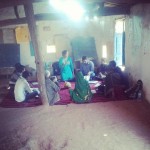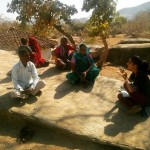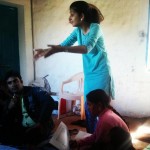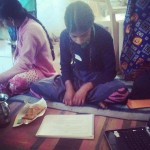Educate for Life is a UK based not for profit that believes schools are about much more than just education, they’re about changing lives. They have created an action-research school-cum-community centre called Hunar Ghar, that serves the community of Bakhel; a remote subsistence farming village and one of the most marginalised in India.
Last week Hunar Ghar underwent a School Self Review and Evaluation facilitated by Adhyayan. In a post for the Educate For Life blog last week Menaka Raman, Online Communications and Social Media Lead for Adhyayan, explained what the Adhyayan Quality Standard (AQS) assessment entails. Here, Ed Forrest, Founder and CEO of Educate for Life, shares his experience of conducting the AQS at Hunar Ghar.
The AQS was a four day programme which ran from Monday to Thursday. It involved two teams, the school self-review team and the Adhyayan review team.
The Adhyayan review team consisted of Swati Gupta and Ranjana Jaiswal. The first day was a full day of training the self-review team from Hunar Ghar. The self-review team consisted of myself, our principal, project manager, four teachers and coordinators, two children, and two members of the school management committee. It was an energising moment for me as Swati began the training, seeing representatives of each of our key stakeholders being brought together for the first time to reflect on the quality of their school.
It was apparent that this was an energising moment for the team as well. They all engaged very strongly, evidently valuing the experience and feeling enabled by the clear and structured framework of the Adhyayan approach. Swati did an excellent job of facilitation. For me as CEO, it was insightful to see how the structure empowered the team, and I learnt a great deal about each of the review team as a result.
Training over, the team spent two days gathering evidence through class observations, learning walks (observation around the school), book looks (inspecting children’s exercise books) and interviews. It was inspiring to see children interviewing teachers, and school management committee members questioning children about their experiences.
The team were also doing things for the first time that we’d wanted them to do for months, even years. For example, despite encouragement, the teachers have previously refrained from doing classroom observations of peers for fear of feeling judged or having someone think they were being judgemental. Under the external facilitation, and by approaching it in small five minute chunks, (class observations by the principal are usually 45 minutes), the peer review happened without, I think, them even noticing it.
The evidence gathering over, we then had to rate ourselves against the AQS ‘what good looks like’. This evoked interesting debate among the team, who didn’t feel that all the questions were applicable in our very rural school. What was so important was that they were avidly discussing each point, justifying why it wasn’t applicable, and then hearing the perspectives of other people. Our team were experiencing a new kind of stimulation evoking them to defend their perspective and practices.
In the end, we were awarded the silver standard (out of four levels: platinum, gold, silver, and bronze). We are only the second school of our kind to receive this level of award. One area that Swati and Ranjana said we did really well in, better than a lot of top performing urban schools, is in the clear joy and happiness that our children have. This is truly something to be proud of.
Within 48 hours of the Adhyayan team leaving, the Hunar Ghar team had already decided their starting strategy to integrating the AQS approach into weekly quality checking standards, adapting the criteria they didn’t like. And that is where the real value of the AQS lies; in providing a framework for school teams to benchmark themselves against their own standards, and act as a transformational motivator for change in their school.
It’s only been a few days, so we will have to wait to see how we are able to incorporate the AQS in a sustainable way. However, I believe we can do this, and look forward to working with Adhyayan further as our team spur themselves on to get platinum!










